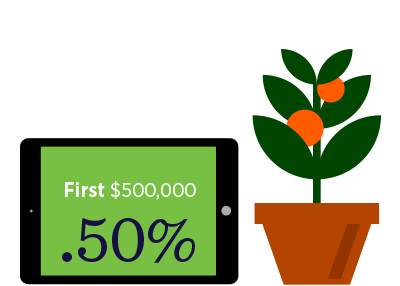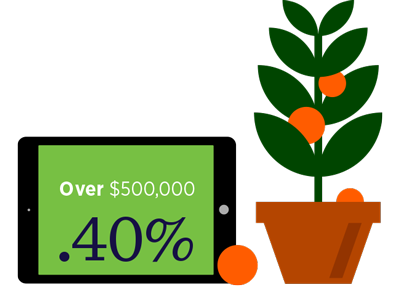You could pay more, but why?
Justwealth is able to provide many of the investment services offered by financial institutions to only their wealthiest clients…
…without the high fees, conflicts of interest, or inconvenient service!
…without the high fees, conflicts of interest, or inconvenient service!
Justwealth’s low annual management fee*


*Justwealth’s annual management fee covers all trading, custody and annual account fees. The minimum Justwealth management fee is $4.99/month for all account types (excluding RESPs/FHSAs). Minimum account size is $5,000 for all non-RESP/FHSA accounts. RESP/FHSA accounts have no minimum account size and are subject to a minimum fee of $2.50/month.
The impact of fees on your investment portfolio
To see just how important fees can be, consider an investor with $100,000. A Justwealth client would pay a low, annual management fee of 0.50%, plus (on average) an additional 0.20% in ETF management fees. A typical mutual fund charges 2.00%. What would you do with the extra money?

Both calculations assume $100,000 investment in a non-taxable account with a gross return of 6% and an annual contribution of $5,000.
- *Justwealth Investor fee is 0.70% (Justwealth fee of 0.50% and average ETF management fee of 0.20%) (Source: Justwealth Financial Inc.)
- **Typical Canadian Mutual Fund Investor fee is 2.00% (Source: Ontario Securities Commission – https://www.getsmarteraboutmoney.ca/learning-path/mutual-funds-segregated-funds/mutual-fund-fees/)
Have a question? Call us at 1.866.407.JUST
Benefits included for all Justwealth clients:

1. Dedicated Personal Portfolio Advisor and support team
2. Investment Policy Statement
3. Professionally-engineered Growth, Income, Preservation and Target Date ETF portfolios
4. Tax-efficient portfolios and account structuring
5. Canadian dollar and U.S. dollar accounts
6. Ongoing portfolio management and automatic rebalancing
7. Personalized financial planning
8. Tax loss harvesting
9. Portfolio transitioning
10. Quarterly market commentary
2. Investment Policy Statement
3. Professionally-engineered Growth, Income, Preservation and Target Date ETF portfolios
4. Tax-efficient portfolios and account structuring
5. Canadian dollar and U.S. dollar accounts
6. Ongoing portfolio management and automatic rebalancing
7. Personalized financial planning
8. Tax loss harvesting
9. Portfolio transitioning
10. Quarterly market commentary
